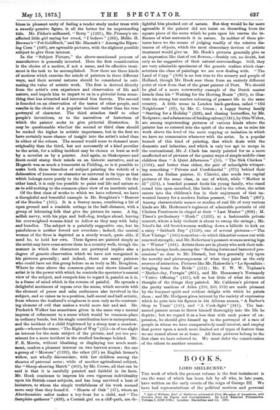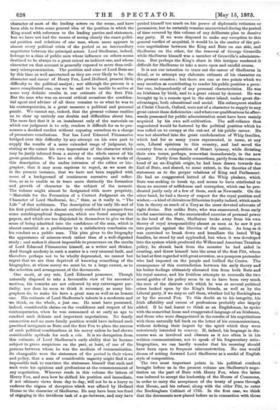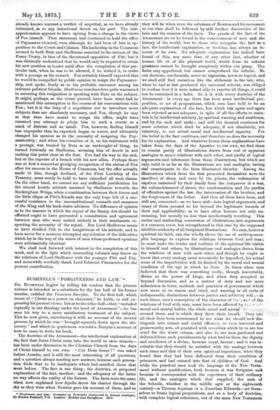BOOKS.
LO RD SHELB URNE.*
THE work of which the present volume is the first instalment is one the want of which has been felt by all who, in late years, have written on the early events of the reign of George III. We have had representations of the political motives and personal * Life of William, Earl of Shelhurne, afterwards First Marquess of Larudowne, with Extracts from his Papers and Correspondeftee. By Lord Edmond Fitzmautice Volume L (1787-1766.) London: Dinoraillan and 00. 1876. character of most of the leading actors on the scene, and have been able to form some general idea of the position in which the King stood with reference to the leading parties and statesmen, but we have not had the means of seeing clearly the exact politi- cal position and relations of one man, whose name appears in almost every political crisis of the period as an intermediary negotiator between the principal actors. Lord Shelburne, indeed, belongs to a class of public men whose influence on others seems destined to be always to a great extent an indirect one, and whose -character on that account is generally exposed to more than ordi- nary misrepresentation. The position and aims of Lord Bute are by this time as well ascertained as they are ever likely to be ; the character and career of Henry Fox, Lord Holland, present little difficulty to the political analyst ; nor although the process is a more complicated one, can we be said to be unable to arrive at some very definite results in our estimate of the first Pitt. But the man who was on several critical occasions the confiden- tial agent and adviser of all three remains to us what he was to his contemporaries, in a great measure a political and personal puzzle. We cannot say, indeed, that the present volume enables us to clear up entirely our doubts and difficulties about him. The mere fact that it is an instalment only of the materials on which-our judgment is to rely, renders it difficult for us to pro- nounce a decided verdict without exposing ourselves to a charge of premature conclusions. Nor has Lord Edmond Fitzmaurice bridged over this difficulty by any attempt on his own part to supply the results of a more extended range of judgment, by stating at the outset his own impressions of the character which may be justly inferred from a survey of the whole career of his great-grandfather. We have so often to complain in works of this description of the undue intrusion of the editor or bio- grapher, that it may seem captious to regret, as we must do in the present instance, that we have not been supplied with more of a background of continuous narrative and reflec- tion, so as to enable us to trace more distinctly the formation and growth of character in the subject of the memoir. The volume might almost be designated with more propriety, "Materials for the Formation of a Correct Judgment on the Character of Lord Shelburne, &c.," than, as it really is, "The Lift" of that nobleman. The description of his early life and of his first political acts is almost entirely confined to passages from some autobiographical fragments, which are found amongst his papers, and which are too disjointed in themselves to give us that sense of being admitted into the confidence of the man, which is almost essential as a preliminary to a satisfactory conclusion on his conduct as a public man. This plan gives to the biography the appearance of scissors-work rather than of a well-digested study ; and makes it almost impossible to pronounce on the merits of Lord Edmond Fitzmatuice himself, as a writer and thinker. And though modesty in such a matter is a very unusual fault, and therefore perhaps not to be wholly deprecated, we cannot but regret that we are thus deprived of knowing something of the biographer, at whose mercy we must be, to a large extent, as to the selection and arrangement,of the documents.
One merit, at any rate, Lord Edmond possesses. Though naturally disposed to take a favourable view of his ancestor's motives, his remarks are not coloured by any extravagant par- tiality, nor does he seem to think it necessary, as many bio- graphers do, to make his hero a great man as well as an honest one. His estimate of Lord Shelburne's talents is a moderate and we think, on the whole, a just one. He must have possessed, indeed, considerable claims on the confidence and respect of his contemporaries, when he was summoned at so early an age to conduct such delicate and important negotiations. No family connection and no mere family position would have induced such practised intriguers as Bute and the first Fox to place the success of such political combinations at his mercy unless he had shown considerable aptitude for such a role. It is no derogation from this estimate of Lord Shelburne's early ability that he became subject to grave suspicions on the part, at leat, of one of the persons between whom he was the medium of communication. So changeable were the statesmen of the period in their views and policy, that a man of considerable sagacity might find it an impossible task to convince the statesman himself that such and such were his opinions and professions at the commencement of any negotiation. Whoever reads in this volume the letters of Henry Fox, and sees how he shifted his position and immediate, if not ultimate views from day to day, will not be in a hurry to endorse the stigma of deception which was affixed by Holland House to the character of Shelburne. He may have been too fond of engaging in the invidious task of a go-between, and may have
prided himself too much on his power of diplomatic reticence or persuasion, but he certainly remains unconvicted during the period of time covered by this volume of any deliberate plan to deceive any party. If we were disposed to make any exception to this general verdict of acquittal, it would be in the matter of the pri- vate negotiations between the King and Bute on one side, and Shelburne on the other, for the removal of George Grenville while Shelburne himself was a member of Grenville's administra- tion. But perhaps the Kings share in this intrigue rendered it difficult for Shelburne to take a more open and candid course.
It is not our intention to trace out the career of Shelburne in detail, or to attempt any elaborate estimate of his character on the present occasion ; but there are one or two points which we may mention as contributing to render his public position a pecu- liar one, independently of any personal characteristics. He was an Irishman by birth, and to a great extent by descent. He was brought up in a remote spot in the sister island, under great dis- advantages, both educational and social. His subsequent studies at Christ Church, Oxford, were not of a character to supply to any great extent these deficiencies; and whatever qualifications he after- wards possessed for public administration must have been mainly acquired by his own self-cultivation. The self-reliance thus engendered would be fostered by the political position which he was called on to occupy at the out-set of hit; public career. He was not absorbed into the great confederation of Whig families, which had for so many years represented, in name, at any rate, Liberal opinions in this country, and had saved the country from a reimposition of Stuart tyranny, while dictating their own terms, perhaps, somewhat immoderately, to the new dynasty. Partly from family connections, partly from the common bond of an un-English origin, he had been drawn towards the Earl of Bute, and shared, to some extent, in the theories of that statesman as to the proper relations of King and Parliament. He had an exaggerated hatred of the Whig phalanx, which Bute was seeking to break up, and seems to have attributed to them an amount of selfishness and corruption, which can be pre- dicated justly only of a few of them, such as Newcastle. On the other hand, he had a theory of respect for the royal position and wishes,—a kind of chivalrous Hibernian loyalty indeed, which made him in theory as much of a Tory as the most devoted advocate of right divine. But unlike Bute, who was enamoured, from early feudal associations, of the uncontrolled exercise of personal power- in the head of the State, Shelburne broke away from his own theory of royal irresponsibility almost as soon as he saw it put into practice against the liberties of the nation. As long as it was exercised to break down and humiliate the hated Whig families, he stood by and applauded, but when it was developed into the system which produced the Wilkes and American Taxation policy, he shrank back from the monster he had aided in creating, and threw himself into the arms of the first Pitt, whom he had at first regarded with great aversion, as a pompous pretender- who had imposed on the people and bullied the Crown. The consequence of this contradiction between his early theory and his better feelings ultimately alienated him from both Bute and his royal master, and his fruitless attempts to reconcile the two moral guides of his policy seem to us to have been very much the root of the distrust with which he was at several political crises looked upon by the King's friends, as well as by the Liberal party, if we may so call them, whether led by Rockingham or by the second Fox. To this doubt as to his integrity, his Irish affability and excess of professions probably also largely added. If he had learnt to think as an Englishman, he spoke with the somewhat loose and exaggerated language of an Irishman, and those who were disappointed in the results of his negotiations with them naturally fell back on the letter of his communications, without defining their import by the spirit which they were notoriously intended to convey. If, indeed, his language in dis- course was as involved and obscure as it too often is in his written communications, not to speak of his fragmentary auto- biographies, we can hardly wonder that his meaning should have been open to frequent misconstniction. No one would dream of setting forward Lord Shelburne as 'a model of English style of composition.
The two most important points in his political conduct brought before us in the present volume are Shelburne's nego- tiation on the part of Bute with Henry Fox, when the latter was induced to accept the leadership of the House of Commons, in order to carry the acceptance of the treaty of peace through that House, and his refusal, along with the elder Pitt, to enter the Rockingham Cabinet of 1765. In the first case, we think that the documents now placed before us in connection with those
already known warrant a verdict of acquittal, as we have already intimated, as to any intentional deceit on his part. The mis- apprehension appears to have sprung from a change in the views of Fox himself. That statesman had continued to hold the office of Paymaster-General, even although he had been of late in op- position to the Court and Cabinet. His leadership in the Commons seemed to both Bute and Shelburne essential to the success of the Peace Treaty, in face of the threatened opposition of Pitt, but it was distinctly understood that he would only be required to retain his new position as leader until after the completion of that par- ticular task, when he was to be allowed, if he wished it, to retire with a peerage as his reward. Fox certainly himself expected that he would be compelled by public opinion to resign the Paymaster- ship, and spoke freely as to his probable successor among his intimate political friends. Shelburne was therefore quite warranted in assuming this resignation in speaking with Bute on the subject. It might, perhaps, as the event proved, have been wiser had he mentioned this assumption in the course of his conversations with Fox ; but it is the duty of a negotiator not to introduce more subjects than are absolutely necessary, and Fox, though he may at that time have meant to resign the office, might have resented any attempt to pledge him to such a course as a mark of distrust and an insult. Fox, however, finding himself less unpopular than he expected, began to waver, and ultimately changed his opinion as to the necessity of resigning the Pay- mastership ; and when his retention of it, on his retirement with a peerage, was treated by Bute as an unthought-of thing, he turned furiously on Shelburne, accusing him of deceit in not making this point clear at the first. Fox had his way in the end, but at the expense of a breach with his new allies. Perhaps there was at first a somewhat grudging recognition of the claims of Fox after his success in the House of Commons, but the offer actually made to him, though declined, of the First Lordship of the Treasury, must surely be held to have cancelled all such claims. On the other hand, we cannot see any sufficient justification for the almost hostile attitude assumed by Shelburne towards the Rockingham Whigs, when a combination between their forces and the little clique of Pitt's friends was the only hope left of a suc- cessful resistance to the unconstitutional counsels and measures of the King and his back-stairs advisers. No difference of opinion as to the manner in which the repeal of the Stamp Act should be effected ought to have prevented a consultation and agreement between men who were united entirely in their sentiments re- specting the necessity of the repeal. But Lord Shelburne seems to have rivalled Pitt in the haughtiness of his attitude, and to have never for a moment attempted any solution of the difficulties which lay in the way of the union of men whose professed opinions were substantially identical.
We shall look forward with interest to the completion of this work, and to the light which succeeding volumes may throw on the relations of Lord Shelburne with the younger Pitt and Fox, and meanwhile cordially thank Lord Edmond Fitzmaurice for the present contribution.




































 Previous page
Previous page